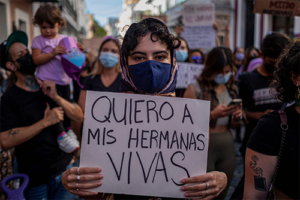Andrea Ruiz did what she could to protect herself from an ex-boyfriend who was constantly following her, harassing and even threatening to publish intimate photos of her on social media.
The terrified 35-year-old woman appeared in court virtually a month and a half ago to file a complaint against Miguel Ocasio, 40, under Puerto Rico’s domestic violence intervention and prevention law.
 A woman holds a sign that reads “I Want My Sisters Alive”
A woman holds a sign that reads “I Want My Sisters Alive”
during a demonstration at the governor’s mansion in
San Juan, Puerto Rico, on May 3.
Ruiz pleaded for Ocasio’s arrest after she was unable to get the court to issue a protection order against the man, whom she had dated for eight months. In a leaked audio of the court appearance, she can be heard describing the pattern of emotional abuse and persecution she endured at his hands before and after they were dating. But the judge said she found “no cause” to arrest Ocasio, who a month later would go on to kill Ruiz.
Her burned body was found on the side of a road in the town of Cayey on April 28, so disfigured that Puerto Rico’s Institute of Forensic Science had to use dental records for identification. The agency determined her death was a homicide. Ocasio confessed to the crime shortly after the body was found. Police said he mortally assaulted Ruiz by using physical force and a knife. Ocasio remains in prison on charges of first-degree murder and destruction of evidence, among others.
As outraged Puerto Ricans demanded accountability from the system that failed to protect Ruiz, another horrific femicide stunned the U.S. territory.
The body of Keishla Rodríguez, 27, was found floating on the San José Lagoon near the Teodoro Moscoso Bridge in San Juan two days after her family reported her missing April 29.
According to a criminal complaint, Rodríguez was killed after she told Puerto Rican boxer Félix Verdejo, whom she had known for most of her life, “that she was pregnant with his child based on a pregnancy test.” Authorities allege that Verdejo punched her and injected her with “a syringe filled with substances purchased from a drug point.” He and an accomplice then tied her up with wire and bound her to a cinder block, later throwing her over the bridge into the water, according to the complaint. Verdejo then shot at Rodríguez with a pistol from the bridge above, the complaint said.
While Verdejo turned himself in to the authorities shortly after Rodríguez’s body was found, he pleaded not guilty to federal charges of carjacking and kidnapping resulting in death, killing an unborn child and using a firearm during a violent crime. Luis Antonio Cádiz Martínez, a second person indicted in Rodríguez’s killing, also pleaded not guilty to similar charges. They are both being held without bail until their respective trials.
The killings of Rodríguez and Ruiz have prompted protests and reignited calls urging Puerto Rican officials to reform a system that has done the bare minimum to address gender violence.
A deadly record amid calls for more funding, action
Puerto Rico Gov. Pedro Pierluisi signed an executive order shortly after taking office in January, declaring a state of emergency due to an increase in cases of gender violence on the island. At least 60 women were killed last year, a 62 percent increase in femicides compared to the previous year, according to the civil rights coalition Observatorio de Equidad de Género.
The move was preceded by months of protests and constant demands from feminist activists, as well as organizations that work with survivors of gender-based violence. The state of emergency was crucial to unlocking much-needed funding and resources to address the crisis.
But the crisis reached a bleak turning point last month. A record number of seven femicides were reported in April, making it the deadliest month for women so far this year. The Observatorio de Equidad de Género estimates that femicides have claimed the lives of at least 21 women in Puerto Rico since the beginning of the year.
“We still have so much left to do,” Irma Lugo, coordinator of the Observatorio de Equidad de Género, told NBC News in Spanish.

